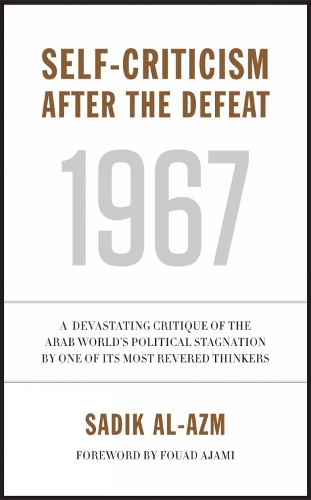
Self-Criticism After the Defeat
(Paperback)
Publishing Details
Self-Criticism After the Defeat
By (Author) Sadik J. Al-Azm
Translated by George Stergios
Saqi Books
Saqi Books
3rd January 2012
United Kingdom
Classifications
General
Non Fiction
Military history: post-WW2 conflicts
Modern warfare
International relations
Political science and theory
956.04
Physical Properties
Paperback
176
Width 135mm, Height 210mm, Spine 10mm
204g
Description
The 1967 War - which led to the defeat of Syria, Jordan and Egypt by Israel - felt like an unprecedented and unimaginable disaster for the Arab world at the time. For many, the easiest solution was to shift the blame and to ignore some of the glaring defects of Arab society. Syrian philosopher Sadik al-Azm was one of the few to challenge such a view in his seminal Self-Criticism After the Defeat. Exposing the political and cultural faults that led to the defeat, he argued that the Arabs could only progress by embracing secularism, gender equality, democracy, and science. Available in English for the first time, Self-Criticism After the Defeat is a milestone in modern Arab intellectual history. It marked a turning point in Arab discourse about society and politics on publication in 1968, and spawned other intellectual ventures into Arab self-criticism.
Reviews
'A unique book ... Al-Azm sought to strip Arab thought of its belief in fate and folk tales and superstition - He told his people the sort of truths that outsiders are too embarrassed to tell - even when they were themselves able to see these truths.' Fouad Ajami; 'A groundbreaking book' Robert Worth, New York Times
Author Bio
Born in Damascus in 1934, Sadik al-Azm is Professor Emeritus of Modern European Philosophy at the University of Damascus in Syria and a recipient of the Erasmus Prize. He was Visiting Professor in the department of Near Eastern Studies at Princeton University until 2008. He earned his PhD (1961) from Yale University, majoring in Modern European Philosophy. Al-Azm was tried in Beirut and dismissed from his teaching post at the American University of Beirut in 1970 in response to his writings. Still actively writing, al-Azm has already left a legacy of piercing intellectual examination of the social, religious, cultural, and political bases of modern Arab thought. Many of his works are still banned in the Arab world.
